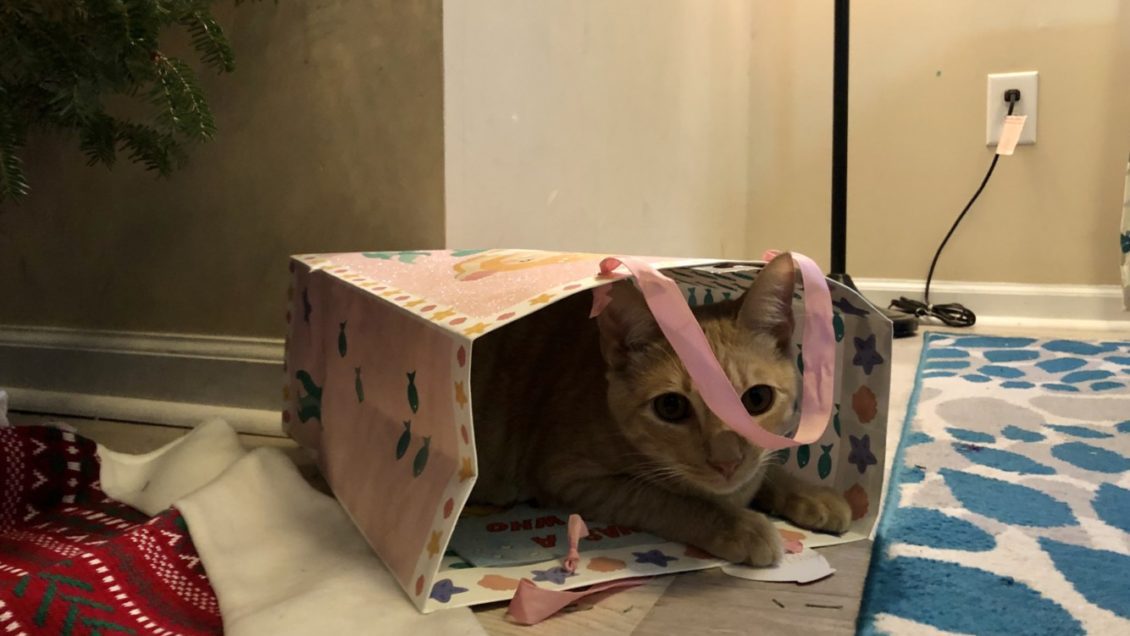
CLEMSON – ’Tis the season to be jolly, but a Clemson University researcher says don’t forget holiday festivities can be stressful and even deadly for some animals.
Ahmed Ali, an assistant professor of animal behavior and welfare in the Clemson Animal and Veterinary Sciences Department and a veterinarian, said holidays can be an extremely stressful time for animals as they are not always aware of the many changes that may occur.
“Many people travel during the Christmas holiday and will often take their animals with them to their destination or board them in a kennel,” Ali said. “These practices can introduce a variety of new stressors and induce some serious behavioral changes.”
Dogs are the most popular pet and companion animal in the United States. The holidays can be an extremely stressful time for dogs because their owners may leave them in kennels when traveling. Dogs can suffer from separation anxiety syndrome (SAS) when they are separated from their owners. Signs a dog is suffering from SAS include extreme grooming that results in self-inflicted wounds and/or extreme mood changes.
To help decrease SAS, Ali suggests developing a pattern of walking the dog followed by positive reinforcement such as giving the dog a bone or toy that it can use to work out some of its anxiety. Getting a companion animal for the dog may also help. Dogs are very social and playful, so a dog suffering from SAS can benefit from having a companion animal to keep it company while its owner is away. Dog owners who suspect their animal is suffering from extreme SAS should contact a veterinarian who can prescribe behavioral regimens, or suggest medications and/or supplements.
Traveling also can stress dogs. Reduced space and loud and unusual noises combined with a different environment can contribute to this stress.
Traveling on planes can be lethal for short-nosed dogs such as Pugs, Boston Terriers, boxers, Pekingese, bulldogs and others. Their shortened noses make these dogs more prone to respiratory problems because they have the same anatomical structures dogs with larger snouts have, just packed in a smaller area. This is similar to moving the same amount of furniture from a house into a smaller apartment – you still have all of the same furniture but it can be cramped. This situation worsens if the dog becomes overweight or obese. Dogs also can experience motion sickness. Contact a veterinarian for information related to traveling with dogs.
While traveling can induce stress on dogs, staying at home also can present problems. For dog owners planning a large gathering at their home, Ali said it’s wise to provide a safe place, such as a quiet room, for dogs to retreat to get away from guests and be alone.
Cats, also, can get stressed when their routines are disrupted such as during holiday festivities. To help relieve this stress, Ali says owners should try to stick to any routine cats may have. Cat owners also can provide a safe place for the cat to retreat so it will not be disturbed by people and noises. For cats that show large quantities of stress, Ali suggests modifying their environments, going back to their regular routines, as well as trying to reduce or remove the stressors. If the cat still appears stressed, Ali says to seek advice from a veterinarian.
For cat owners who are traveling and cannot bring their animals, Ali says it is important to remember cats like routine and familiarity.
“Boarding could just induce more stress on a cat,” he said. “If cat owners have to choose between boarding their cat or leaving it at home, I would recommend the second option.”
With the holidays also come decorations. Ali said some decorations may be dangerous for animals. Plants such as Christmas cacti, lilies, holly berries and poinsettias can be poisonous and life-threatening if consumed. Pine needles and metal hooks used to hang ornaments can puncture the intestinal lining if swallowed. Tinsel and ornaments are also potential hazards and can cause intestinal blockage if consumed.
In addition to dogs and cats, other pets include birds and bunnies. Care for these animals is much like caring for dogs and cats, Ali said. This care includes providing a safe room for these animals to retreat if guests are coming over. Also, keep holiday decorations, food and plants out of reach.
Following these few tips can help ensure animals and their owners enjoy the holidays. Anyone with specific questions or concerns should discuss these with a veterinarian.
-END-
Get in touch and we will connect you with the author or another expert.
Or email us at news@clemson.edu
